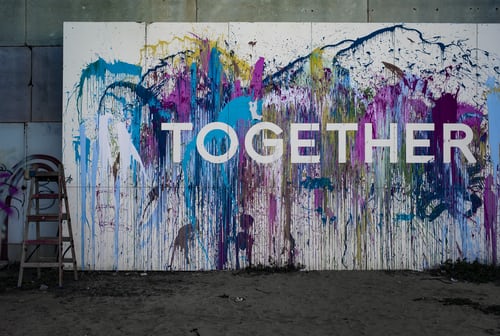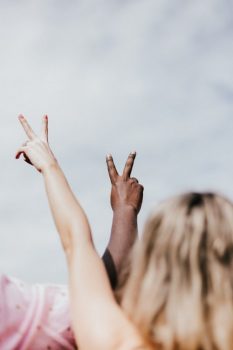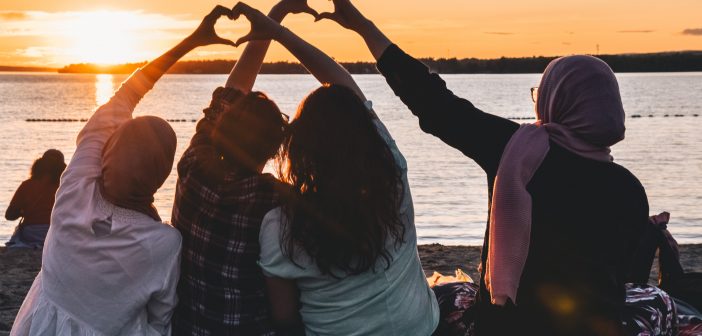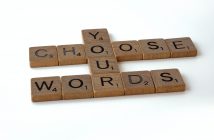“If you want to make peace, you don’t talk to your friends. You must talk to your enemies” — Moshe Dayan
The Covid-19 pandemic has changed what we once knew as normal. It has flipped our world upside down, highlighted areas that need change, and brought communities together. We have witnessed the rapid spread of a disease, an ending of a presidency, the beginning of a new presidency, peaceful protests, riots, political division, and social injustice. Much like Pandora’s box, this pandemic has triggered deep historical wounds pushing our failures and challenges in the face of every American.
Ready or not, this pandemic demanded us to make changes— be it personal or societal— and left no one untouched. As to be expected, this comes with the feeling of being uprooted and an increase in one’s level of insecurity. Although it feels like we have shared similar experiences as a community, we can never know how someone else is experiencing a situation. These differences have led to an increase in discussions regarding race, politics, and the well-being of our society. Highly sensitive topics like these are being discussed openly with no boundaries or safety precautions, thus allowing anyone who chooses to disrupt the message to do so. Creating a neutral platform and learning new skills to communicate effectively can support healthy communication.

Photo by Adi Goldstein on Unsplash
For many, social media has become the number-one vehicle of communication. Everyone can freely share their opinion with the world from the convenience of their home. What is it that creates barriers to understanding another person’s perspective? Would effectively communicating with one another help us to better understand one another?
I pondered on these questions as I watched the fighting and violence increase within our country towards our citizens. As I watched mass media during my quarantine, I became more aware of the disagreements within our country. The divide became more apparent with visual aids shown on the news providing actual data identifying the populace of each side leaving no mystery. The divide amongst each political party was emphasized even more so than ever before when this should be a time for us to come together.
Miscommunication on a personal level can give rise to a larger miscommunication between groups in our society. Communicating effectively is the key and the foundation needed before we can tackle the bigger issues. In order to begin the process of improvement in this country, we have to start with how we communicate with one another. Based on the news people have a lot to say— although what is being reported is sometimes expressed through violence. This expression of communication isn’t effective and contributes to the violent patterns that our country has utilized for centuries. Organized group rallies or protests to use as a platform’s success could be affected when violent behaviors accompany the message.
Effective communication is communication that produces intended or desired results. To effectively communicate is a two-way process— sending the right message and to the right person while effectively listening to their response.
It is important to understand the psychology of who you are interacting with, as well as their experiences
Effectiveness in communication depends on “how” you communicate. One way is for the sender of the message to be relaxed, have good eye contact, and be mindful of their tone of voice. It can be very intimidating when someone becomes hostile or emotional during a communication. Reactivity can cause you to lose the listener’s attention, breaking down communication before it begins.
Active listening is another skill needed for effective communication. Active listening is the brain’s absorption of the meaning of words and sentences. Active listening leads to the understanding of facts and ideas. Most of us are told to listen when we are children, but common complaints heard from adults is “they never listen,” “they don’t understand what I’m saying,” and “I don’t think I’m being heard.” The act of listening can be complex and should be noted as such.
There are various stages for effective listening: hearing and focusing on the message, not the person, comprehending not interpreting, analyzing and evaluating, responding, and remembering.
Each of these skills can be challenging, especially when talking about difficult topics. Being mindful of yourself and your emotions while listening can help you to stay on track with the topic. Many times, the listener begins to think about their response instead of allowing the sender to finish their point. This then leads to a disruption within the conversation and possibilities of miscommunication increase.
The essentials needed to increase effective listening skills are: be prepared to listen, stop talking, repeat/paraphrase, clarify and probe, and maintain eye contact with the person whom you are speaking.
Following these guidelines can increase the success of the conversation and end with both the sender and the listener feeling heard and satisfied in their communication. Wouldn’t it be nice to take these simple techniques and apply them during a conversation that could affect our society in a positive way? After all, we all have needs, and we all have different experiences. Respecting a person in the moment, and allowing them to express themselves without judgment while allowing a person to be heard, could have a huge impact on both the sender and the listener.

Photo by Priscilla Du Preez on Unsplash
There are numerous reasons why communication is so difficult. Emotions can easily overtake the sender or the listener. The breakdown in communication happens if both parties can not find a middle ground in order to remain neutral. Important but challenging topics such as racism, inequality, and immigration are imperative to discuss but seem to get squashed as these conversations become emotionally charged. We can continue to argue, or we can learn to be empathetic and allow our differences to be spoken.
Not everyone is ready for change, and we must accept that as well. However, we also must start somewhere. We can begin by allowing each other to speak freely amongst diverse communities, sharing our concerns and ideas safely in order to better understand each other’s experiences in the world.
The connection with like-minded people will naturally occur, and much of the adversity we are experiencing comes from the inability to communicate with those who differ from our thinking. When we can better understand each other’s experiences and needs, we can start to break down the barriers that divide us. We can come together with the intention of creating peace. We can become capable of having new experiences. We must increase our understanding of other opinions in order to create a healthy and humane society.
Featured Image:Photo by Noorulabdeen Ahmad on Unsplash




